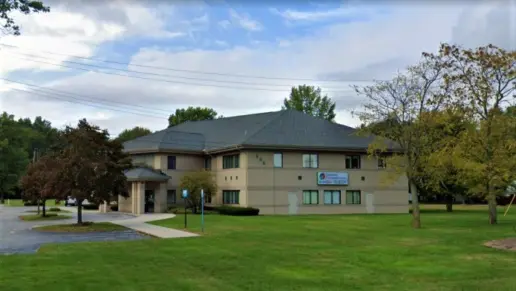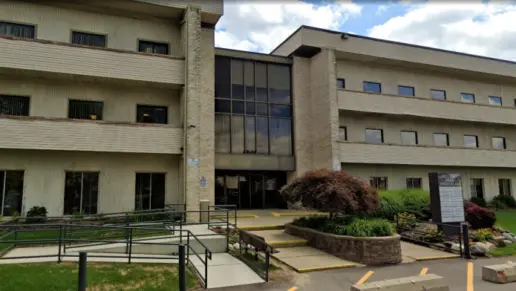About the Facility
Sacred Heart Rehabilitation Center, in Port Huron, Michigan, offers outpatient and residential programming for adults in addiction recovery. Additional services include dual diagnosis care, medication assisted treatment (MAT), women’s programs, supportive independent living houses, and aftercare support. Their primary treatment modalities include psychotherapy and recovery focused life skills training.
Sacred Heart Rehabilitation Center is a drug and alcohol rehab for adults in Port Huron, Michigan. They offer specialized services for veterans, justice involved persons, adolescents, women, and persons with co-occurring addiction and mental illness.
The outpatient program supports clients’ long term recovery through a robust continuum of care aligned with clients’ evolving needs. Their levels of care include intensive outpatient (IOP) and standard outpatient programming. Clients receive medical and mental health assessments, personalized care plans, and comprehensive case management. They also engage in intensive, trauma informed individual, group, and family counseling. Medication assisted treatment (MAT) is available. They also prioritize addiction education and recovery focused life skills training.
Clients in residential care continue to participate in intensive psychotherapy and recovery education. In the supportive living environment, clients also cultivate independent living skills to support their reintegration into their family, workplace, and community while maintaining their sobriety. Robust aftercare planning facilitates clients’ transition from residential care and into community based outpatient recovery programs.
Sacred Heart Rehabilitation Center is accredited by SAMHSA. They accept private insurance, Medicaid, and self pay. Financial aid and per session fee schedules are available.
 Accreditations
Accreditations

SAMHSA
The Substance Abuse and Mental Health Services Administration (SAMHSA) is a branch of the U.S. Department of Health and Human Services. Established in 1992 by congress, SAMHSA's mission is to reduce the impact of substance abuse and mental illness on American's communities.
SAMHSA Listed: Yes
 Treatment
Treatment
 Alcoholism
Alcoholism
Alcoholism is characterized by the excessive or compulsive use of alcohol, which does not stop despite negative consequences. This compulsive use leads to psychological and physical dependence. To break this dependence, alcohol rehab in Michigan is necessary. Treatment is available from a range of services, including residential programs, outpatient treatment, AA, medical detox, and evidence-based counseling. Support systems are also a crucial part of long-term recovery.
 Drug Addiction
Drug Addiction
Drug rehab in Michigan provides personalized treatment to help individuals break this cycle and regain control of their lives. Treatment methods are used in various levels of care, including inpatient rehab, partial hospitalization programs, intensive outpatient programs, and standard outpatient treatment.
 Dual Diagnosis
Dual Diagnosis
Michigan's dual-diagnosis addiction treatment programs provide specialized treatment for individuals with co-occurring substance use disorders and mental health conditions. Levels of care include outpatient, inpatient, and partial hospitalization options. Using a combination of evidence-based therapies, trauma-informed care, group therapy, and psychoeducation, clinicians can help you address the underlying cause of your addiction, treat both disorders, and promote overall mental health and well-being. You’ll also develop a support network and enhance your coping skills.
 Mental Health and Substance Abuse
Mental Health and Substance Abuse
If you're in Michigan and seeking help for both mental health and substance abuse, dual-diagnosis rehabs offer comprehensive care to meet your specific needs. These specialized facilities combine evidence-based therapies such as cognitive-behavioral therapy (CBT), dialectical behavior therapy (DBT), eye movement desensitization and reprocessing (EMDR), and experiential therapies — like mindfulness, yoga, and recreation therapy — to addressing both aspects of your mental health. This integrated approach provides holistic recovery, prioritizes your overall well-being, and gives you the tools for lasting recovery.
 Opioid Addiction
Opioid Addiction
Opioid rehabs specialize in supporting those recovering from opioid addiction. They treat those suffering from addiction to illegal opioids like heroin, as well as prescription drugs like oxycodone. These centers typically combine both physical as well as mental and emotional support to help stop addiction. Physical support often includes medical detox and subsequent medical support (including medication), and mental support includes in-depth therapy to address the underlying causes of addiction.
 Insurance and Financial
Insurance and Financial
Medicaid
Private insurance
Self-pay options
Financial aid
Per session
 Programs
Programs
-
Adolescence program
-
Adult program
-
Hearing impaired program
-
Program for men
-
Program for women
-
Young adult program
 Levels of Care
Levels of Care
 Outpatient
Outpatient
Clients receiving care at an outpatient rehab remain in their own homes and attend treatment as often as daily, depending on the level of need. Outpatient care generally consists of psychotherapy, addiction education, life skills training, and community reintegration support. Many outpatient treatment centers provide step-down care, including partial hospitalization (PHP), intensive outpatient (IOP), sober living, and standard outpatient services. Some outpatient rehabs also offer ambulatory medical detox and medication assisted treatment (MAT).
 Intensive Outpatient
Intensive Outpatient
Clients receiving care in an intensive outpatient program (IOP) typically have completed inpatient treatment, but some choose to enroll in IOP immediately following detox. Intensive outpatient rehabs offer high-level support for clients in early recovery and those at an increased risk of relapse. Most programs provide between nine and 20 hours of treatment per week, with services ranging from addiction counseling to recovery education to medication assisted treatment (MAT). Holistic therapies, such as acupuncture, are common.
 Sober Living Homes
Sober Living Homes
Sober living homes in Michigan is less strict than an inpatient care facility. It acts as a bridge between this intensive level of care and the freedom of independent living. The primary rule in a men’s sober living home is to stay sober. If a resident breaks this rule, they are typically evicted. However, this environment is designed to prevent relapse, with mutual support, 12-step meetings, a structured schedule, and drug screenings.
 Inpatient
Inpatient
Residential treatment programs are those that offer housing and meals in addition to substance abuse treatment. Rehab facilities that offer residential treatment allow patients to focus solely on recovery, in an environment totally separate from their lives. Some rehab centers specialize in short-term residential treatment (a few days to a week or two), while others solely provide treatment on a long-term basis (several weeks to months). Some offer both, and tailor treatment to the patient's individual requirements.
 12-Step
12-Step
12 step programs are typically community-based and peer-led, though many rehabs base their treatment models on this approach. Participants engage in regular 12 step meetings, which are anonymous, free, and accessible multiple times a day, 365 days a year in most communities. Participants are also mentored by self-selected sponsors who support them as they work through the 12 steps of recovery, which include addressing the causes of the disease, taking personal responsibility, and relinquishing control.
 Aftercare Support
Aftercare Support
Completing a drug or alcohol rehab program shouldn't spell the end of substance abuse treatment. Aftercare involves making a sustainable plan for recovery, including ongoing support. This can include sober living arrangements like halfway houses, career counseling, and setting a patient up with community programs like Alcoholics Anonymous (AA) or Narcotics Anonymous (NA).
 Clinical Services
Clinical Services
Cognitive Behavioral Therapy
Cognitive Behavioral Therapy (CBT) is a therapy modality that focuses on the relationship between one's thoughts, feelings, and behaviors. It is used to establish and allow for healthy responses to thoughts and feelings (instead of unhealthy responses, like using drugs or alcohol). CBT has been proven effective for recovering addicts of all kinds, and is used to strengthen a patient's own self-awareness and ability to self-regulate. CBT allows individuals to monitor their own emotional state, become more adept at communicating with others, and manage stress without needing to engage in substance abuse.
Family Therapy
Research clearly demonstrates that recovery is far more successful and sustainable when loved ones like family members participate in rehab and substance abuse treatment. Genetic factors may be at play when it comes to drug and alcohol addiction, as well as mental health issues. Family dynamics often play a critical role in addiction triggers, and if properly educated, family members can be a strong source of support when it comes to rehabilitation.
Group Therapy
Group therapy is any therapeutic work that happens in a group (not one-on-one). There are a number of different group therapy modalities, including support groups, experiential therapy, psycho-education, and more. Group therapy involves treatment as well as processing interaction between group members.
Individual Therapy
In individual therapy, a patient meets one-on-one with a trained psychologist or counselor. Therapy is a pivotal part of effective substance abuse treatment, as it often covers root causes of addiction, including challenges faced by the patient in their social, family, and work/school life.
Motivational Interviewing
Motivational Interviewing (MI) is a clinical approach to helping people with substance abuse issues and other conditions shift behavior in positive ways. It is more goal-oriented than traditional psychotherapy, as MI counselors directly attempt to get clients to consider making behavioral change (rather than wait for them to come to conclusions themselves). Its primary purpose is to resolve ambivalence and help clients become able to make healthy choices freely.
Trauma Therapy
Trauma therapy addresses traumatic incidents from a client's past that are likely affecting their present-day experience. Trauma is often one of the primary triggers and potential causes of addiction, and can stem from child sexual abuse, domestic violence, having a parent with a mental illness, losing one or both parents at a young age, teenage or adult sexual assault, or any number of other factors. The purpose of trauma therapy is to allow a patient to process trauma and move through and past it, with the help of trained and compassionate mental health professionals.
 Settings and Amenities
Settings and Amenities
-
Private setting
 Contact
Contact
1406 8th street
Port Huron MI, 48060


